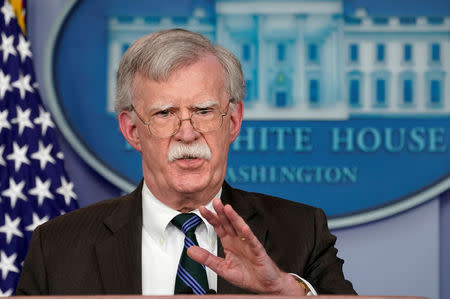U.S. security advisor warns Turkey against attacking Kurdish fighters after U.S. pull-out from Syria

By Steve Holland
JERUSALEM (Reuters) - White House national security advisor John Bolton added a new condition on Sunday to the U.S. withdrawal from Syria, saying Turkey must agree to protect the United States' Kurdish allies.
President Donald Trump's abrupt decision to announce a U.S. pull-out from Syria left many questions open, chiefly whether Kurdish fighters who had been operating in northern Syria alongside U.S. forces would now be targetted by their long-time enemy Turkey.
Bolton, on a trip to Israel and Turkey, said he would stress in talks with Turkish officials, including President Tayyip Erdogan, that Kurdish forces must be safeguarded.
"We don't think the Turks ought to undertake military action that's not fully coordinated with and agreed to by the United States at a minimum so they don't endanger our troops, but also so that they meet the president's requirement that the Syrian opposition forces that have fought with us are not endangered," Bolton told reporters ahead of talks with Israeli officials.
Asked whether a U.S. withdrawal would not take place in Syria until Turkey guaranteed the Kurdish fighters would be safe, Bolton said, "Basically, that's right."
The Syrian YPG militia has been highly effective in the war against Islamic State, a part of the wider Syrian conflict pitting a range of insurgent groups against President Bashar al-Assad's forces and sometimes against each other.
But Turkey has long castigated Washington for its military relationship with the Syrian YPG militia. Ankara regards the YPG an extension of the PKK, a Kurdish group which has waged a 34-year-old insurgency in Turkey.
The YPG has indicated that it might seek a deal with Damascus after the U.S. forces have gone.
Bolton, who will travel to Turkey on Monday, said the United States will talk to Ankara to find out what its objectives and capabilities were.
Erdogan's spokesman Ibrahim Kalin said Turkey's targets were the YPG, the PKK and Islamic State.
"One aim of Turkey's fight against the PKK and its Syrian extensions is to rescue the Kurds from the cruelty and oppression of this terrorist group," state-owned Anadolu news agency quoted Kalin as saying, in comments that emerged after Bolton made his remarks.
"Turkey will continue decisively its efforts to end the war, provide security, and implement the process of political transition without discriminating between our Syrian brothers on the basis of religion, ethnicity or sect," Kalin said.
DECIMATING
In Washington on Sunday, Trump reiterated that the United States would be pulling its troops out of Syria but suggested the move might not happen soon.
"I never said we are doing it that quickly. But we are decimating ISIS," Trump told reporters.
Bolton was due to hold talks later on Sunday with Israeli Prime Minister Benjamin Netanyahu, who said the discussions would focus on Iran's role in the region and the situation in Syria.
"We will continue to act against the Iranian military entrenchment in Syria...and we will act against any element that undermines, or attempts to undermine the security of Israel," Netanyahu said in public remarks to his cabinet.
Israel has often voiced alarm at the clout of Iran, an ally of Assad, in the Syrian civil war. The Israeli air force has struck scores of targets it describes as Iranian deployments or arms transfers to the Lebanese Hezbollah group, which also backs Assad.
(Additional reporting by Daren Butler in Istanbul and Jeffrey Heller in Jerusalem; Editing by Angus MacSwan)

